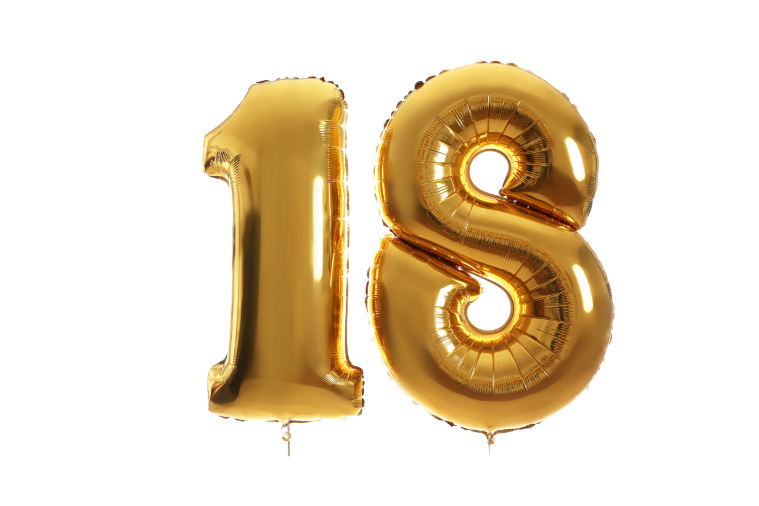Life is Full of Firsts
Growing up, I couldn’t wait to be an adult and to experience all the coming-of-age events.
My first house key, first kiss, first boyfriend, first driving lesson…
The list was endless and life was full of firsts.
Overflowing excitement of what was happening and what was to come. I remember clearly the first time I went away on holiday by myself, my first job and the first car. Just thinking of the excitement and expectation reminds me of the wonder and possibilities of my journey into adulthood.
There are also those the bigger firsts.
Graduation, getting married, having children…
In time you get to the point where you have done so many firsts, and then all of a sudden, you are now an adult!
There isn’t a defined line when you become a “real” adult, a fully-fledged grown-up. It’s more a series of stages. Cumulative experiences and the wisdom gained from all those experiences and events, both the good and the bad.
Many of the firsts we know about, we expect them. It’s those hidden firsts, that you don’t really acknowledge, but they happen all the same. Debt is one of them and it’s a sneaky, high impact life changing first.
Finally in Control of My Life
As I approached my 18th birthday, I could hardly wait to be considered old enough to be a legally responsible person. It meant I was going to be finally in control of my life. All I could see were the positives. I could make my own decisions.
What at first is freedom, quickly became burdensome.
How is an 18-year-old supposed to know the fiscally responsible action for each situation without sufficient teaching?
Being a responsible adult, ready to join society I did what many other 18-year-olds do, and I entered into a credit agreement.
Within days of turning 18, I was signed up to a mail order CD purchase service. Where I paid a set amount every month for some CDs.
Yes, it was the year 2000 and CDs were the thing. Hard to believe now but they were awesome at the time. It was how we consumed music and even used portable personal CD players.
I would take pride in listening to my CDs between classes or when I was travelling to and from sixth-form college. It didn’t matter that they were bulky and seemed to get scratched if you even touched them, rendering them useless.
I knew I was responsible for making the regular monthly payments. For the lengthy period of the contract. It’s just that I didn’t realise that by entering my first contract for credit I had started a cycle of debt that I am still working my way out of 24 years later.
That CD subscription became an overdraft, then student loans and monthly car insurance payments, phone contracts, then after graduating university I had my very first credit card.
Between 18 years of age and 23 years old I had not only dipped my toes into the world of adulting, I was a fully-fledged card-carrying consumer who not only had access to debt but made full use of it.
I didn’t realise the impact of debt.
I knew that I had to pay the money back, I just didn’t have the visibility of how long that would take, and the associated opportunity cost of having debt.
Didn’t everyone have debt. It was normal right? We just didn’t ever talk about it.
Impact of Debt at a Young Age
Sometimes that dream job you really want is out of reach, because you can’t pass vetting due to debt levels.
The holiday you can’t take because you must earn enough to service your debt.
The extra shifts you must do that will just cover the interest. Instead of hanging out with friends and making memories.
The realisation that you are working just to pay off debt.
When we had our children, I couldn’t give up work because I “had” to work. We needed the two incomes to pay the bills. A big chunk of that was the payments towards the consumer debt. We were careful, but without the financial education we didn’t do that great of a job at managing our money.
We did a reasonable job, but not great.
It all stems back to making huge financial decisions of entering into credit agreements without an adequate level of financial literacy.
Credit is Fast and Loose
So here we are 24 years on from when I officially came of age and if anything, the situation for 18-year-olds today is far more precarious. As children transition into adulthood, credit is easier than ever to come by. Just a few examples:
- Buy now pay later
- Car loan
- Catalogue credit
- Credit cards
- Hire purchase
- Loans
- Phone contracts
- Store cards
- Student loans
The younger generation is bombarded with advertising and societal pressures to have more, and to be the “best” version of themselves.
With the expansion of peer groups through social media, there is constant exposure to the never-ending drain on finances to fit in and be one of the crew. To be normal.
Normal is being in debt, and with a bunch of stuff.
Financial Literacy
Stop the next generation from joining the damming cycle of debt. Give them the opportunities that we lost due to debt. Help them to make the better decisions that we wish we had made.
To do this we need to increase financial literacy. Encourage young adults to learn more about mastering their own money so that their money can work for them and build their own wealth.
Don’t shy away from talking about money. Its incredibly important and could have a huge impact on that persons future financial situation.
Prepare the next generation to be financially responsible. They have a responsibility to themselves and their future families, but its unfair to expect them to know what to do without the proper knowledge.
Teach about the dangers of debt, the debt spiral, credit scores, living within your means, budgeting. There are so many subjects that once you know about them it’s a real game changer.
Teach about the freedom you get when you are not tied down with debt. When you can go travelling because you are not bound to your job due to debt.
It’s basic stuff but you don’t know what you don’t know. I had to learn the hard way, just like countless others.
The ideal scenario will be a generation that shuns away from the materialistic consumer lifestyle and into one where they acknowledge the responsibility that they have to themselves and to their future family, to start their adult life on the right financial footing.
A wrong step early on can have devastating consequences.
Today’s treasure is tomorrow’s junk. Do you still want to be paying for it in 25 years’ time?

